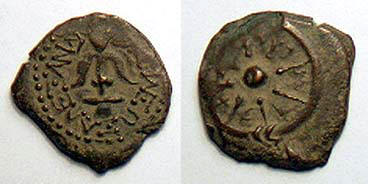
 |
Freethought & Rationalism ArchiveThe archives are read only. |
|
|
#31 |
|
Veteran Member
Join Date: Sep 2005
Location: San Bernardino, Calif.
Posts: 5,435
|
|
|
|
|
|
#32 |
|
Veteran Member
Join Date: Jun 2010
Location: seattle, wa
Posts: 9,337
|
Yeshu is a diminutive of the Hebrew name Joshua. It if a 'two and a half letter' form of the name Jesus known already to Irenaeus (Against Heresies Book Two). On Irenaeus calling Iota (= yod) a half letter http://books.google.com/books?id=QHU...ter%22&f=false
|
|
|
|
|
#33 | |
|
Veteran Member
Join Date: Oct 2007
Location: Chicago Metro
Posts: 1,259
|
Quote:
Hope this is of interest (if not, just ignore!  ). ).Regards, Sarai |
|
|
|
|
|
#34 | ||||
|
Veteran Member
Join Date: Mar 2009
Location: England
Posts: 2,527
|
Quote:
I did a quick Google search and found these two links. Quote:
Quote:
|
||||
|
|
|
|
#35 |
|
Veteran Member
Join Date: Jun 2010
Location: seattle, wa
Posts: 9,337
|
Yes, I was aware that King Jonathan appears in the DSS. It is from the numismatic evidence that we learn his Greek name was Alexander. Important Jewish people had Greek and Hebrew names apparently. Hence the double name for John Mark and which, when coupled with the persistent traditions which identify him as owning a house in Jerusalem as well as having a presence in Galilee (and Alexandria and North Africa if we accept the Coptic tradition) make him appear to be a very wealthy individual.
|
|
|
|
|
#36 |
|
Veteran Member
Join Date: Mar 2009
Location: England
Posts: 2,527
|
 Coin of Alexander Jannaeus (103 BC to 76 BC). Obv: Seleucid anchor and Greek Legend: BASILEOS ALEXANDROU "King Alexander". Rev: Eight-spoke wheel or star within diadem. Hebrew legend inside the spokes: "Yehonatan the King". http://www.jewishcoins.net/ancient-i...-jannaeus.html |
|
|
|
|
#37 |
|
Veteran Member
Join Date: Oct 2007
Location: Chicago Metro
Posts: 1,259
|
Hi MaryHelena and Stephan,
I too saw those tidbits online when I googled looking for a decent photo of the fragments. (Alas, I found no good photos of the fragments themselves.  ) It just seems to me it's possible that the "King Jonathan" of these fragments isn't necessarily Alexander Yannai, and without paleographic or C14dating to back up their assertion, the ID of "King Jonathan" is, so to speak, up for grabs. ) It just seems to me it's possible that the "King Jonathan" of these fragments isn't necessarily Alexander Yannai, and without paleographic or C14dating to back up their assertion, the ID of "King Jonathan" is, so to speak, up for grabs. Regards, Sarai |
|
|
|
|
#38 | ||
|
Veteran Member
Join Date: Mar 2009
Location: England
Posts: 2,527
|
Quote:
Hi, Sarai Yes, it looks as though the identification of King Jonathan with Alexander Jannaeus does not go down very well in some circles - understandably so. Quote:
|
||
|
|
|
|
#39 |
|
Veteran Member
Join Date: Jun 2010
Location: seattle, wa
Posts: 9,337
|
I am on vacation but I am at loss to see how the Jewish Virtual library citation in any way questions the fact that king Jonathan was also called Alexander. Admittedly I am reading this sitting by a pool in the sun but I am baffled by the argument.
|
|
|
|
|
#40 | ||
|
Veteran Member
Join Date: Mar 2009
Location: England
Posts: 2,527
|
Quote:
Quote:
Perhaps my wording was not the best - the identification is not questioned in the Jewish Virtual Library citation - what is questioned is the validity of the prayer - positive or negative...... Wikipedia gives a reference to an article by Vermes - which seems to indicate that he has questioned the mention of King Jonathan in the DSS (don't seem able to find the article....) ^ See Vermes, G., "The So-called King Jonathan Fragment (4Q448)" in JJS 44 (1993) 294-300. |
||
|
|
| Thread Tools | Search this Thread |
|